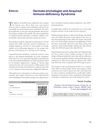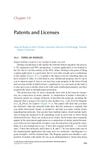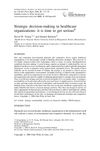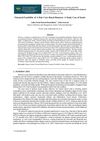 3 citations,
April 2022 in “Clinical, Cosmetic and Investigational Dermatology”
3 citations,
April 2022 in “Clinical, Cosmetic and Investigational Dermatology” Different methods, including stress management, healthy diet, supplements, and treatments like minoxidil, can help hair grow back after COVID-19 related hair loss.
 June 2023 in “Historical records of Australian science/Historical Records of Australian Science”
June 2023 in “Historical records of Australian science/Historical Records of Australian Science” George Ernest Rogers was a notable scientist who made important discoveries about hair and wool proteins.
 June 2023 in “Dermatology and therapy”
June 2023 in “Dermatology and therapy” The Middle East and Africa need better data, treatment consensus, and support for Alopecia Areata.
 October 2023 in “Journal of the Endocrine Society”
October 2023 in “Journal of the Endocrine Society” A woman was diagnosed with Sheehan's syndrome and a rare complication of diabetes insipidus 33 years after symptoms began, improving with hormone therapy.
 December 2020 in “Journal of Drugs in Dermatology”
December 2020 in “Journal of Drugs in Dermatology” The document concludes that more research is needed to confirm if blood tests for things like iron and vitamin D are helpful for hair loss from Telogen effluvium.

Celiac disease requires more than just a gluten-free diet for effective management.
 January 2014 in “International Journal of Trichology”
January 2014 in “International Journal of Trichology” Hair changes are common in AIDS patients and can add to their financial and emotional stress.
 October 2023 in “Journal of Medicine, University of Santo Tomas (JMUST Online)”
October 2023 in “Journal of Medicine, University of Santo Tomas (JMUST Online)” Elderly patients frequently suffer from skin conditions, especially inflammatory ones, highlighting the need for better healthcare.
 March 2024 in “IP Indian journal of clinical and experimental dermatology”
March 2024 in “IP Indian journal of clinical and experimental dermatology” Elderly in South India commonly suffer from skin issues like wrinkles, dryness, and infections, needing better skin care education.
 March 2024 in “World Journal Of Advanced Research and Reviews”
March 2024 in “World Journal Of Advanced Research and Reviews” Educators who survived COVID-19 faced physical, psychological, and social challenges but overcame them with resilience and support, highlighting the need for schools to provide better health and psychological care.
 July 2024 in “British journal of surgery”
July 2024 in “British journal of surgery” Stem cell therapy shows promise for treating hair loss.
 March 2023 in “Journal of the turkish academy of dermatology”
March 2023 in “Journal of the turkish academy of dermatology” High levels of ceruloplasmin might indicate more severe toenail fungus.

Stress significantly contributes to hair loss, especially in women and those aged 31-40.
1 citations,
September 2021 in “Nigerian journal of medicine : journal of the National Association of Resident Doctors of Nigeria” Androgenetic alopecia is common in South-West Nigeria, affecting more men than women, with stress worsening the condition.
 September 2024 in “Journal Of Social Sciences And Humanites”
September 2024 in “Journal Of Social Sciences And Humanites” A combined approach of medical treatments, natural remedies, diet, and stress management is best for hair regrowth in Cambodia.
 26 citations,
October 2018 in “Clinical & Translational Oncology”
26 citations,
October 2018 in “Clinical & Translational Oncology” Spanish experts provided guidelines for treating skin side effects in cancer patients on new therapies, stressing early action and teamwork.
 February 2008 in “Expert Review of Dermatology”
February 2008 in “Expert Review of Dermatology” Seborrheic dermatitis significantly lowers quality of life, especially in young people, women, and those with higher education.
8 citations,
August 2016 in “Expert opinion on pharmacotherapy” New, safer treatments for children's hair disorders are needed, and better evaluation methods are recommended.
 January 2014 in “Elsevier eBooks”
January 2014 in “Elsevier eBooks” Patents don't guarantee money; inventors must work hard and stay involved.
 September 2008 in “Fertility and Sterility”
September 2008 in “Fertility and Sterility” Greater intimacy leads to better self-reported health in couples having infertility treatment.
 31 citations,
November 2013 in “Dermatologic Clinics”
31 citations,
November 2013 in “Dermatologic Clinics” The ARTAS robotic system for hair restoration is efficient with fewer cuts than manual methods, but it's limited to certain hair types and can still leave scars.
 17 citations,
July 2006 in “The International Journal of Health Planning and Management”
17 citations,
July 2006 in “The International Journal of Health Planning and Management” Healthcare organizations must seriously focus on strategic decision-making to succeed in a complex market.
 2 citations,
February 2024 in “Journal of the European Academy of Dermatology and Venereology”
2 citations,
February 2024 in “Journal of the European Academy of Dermatology and Venereology” The study created a 27-item measure to assess the impact of skin diseases.
 305 citations,
July 2016 in “International Journal of Biological Macromolecules”
305 citations,
July 2016 in “International Journal of Biological Macromolecules” Polysaccharides have many health benefits and are used in drugs, but isolating and purifying them is complex and requires careful methods.
 42 citations,
September 2018 in “Journal der Deutschen Dermatologischen Gesellschaft”
42 citations,
September 2018 in “Journal der Deutschen Dermatologischen Gesellschaft” Adult female acne requires a comprehensive treatment approach, including medical options and lifestyle changes, with attention to psychological well-being.
 16 citations,
March 2015 in “Clinical Cancer Research”
16 citations,
March 2015 in “Clinical Cancer Research” The document concludes that side effects from Smoothened inhibitor drugs for skin cancer are reversible and can be managed with a team approach to maintain quality of life.

The conference emphasized innovative solutions for global challenges, including disaster architecture, education, health, and economic impacts.
 3 citations,
July 2015 in “European Journal of Dermatology”
3 citations,
July 2015 in “European Journal of Dermatology” AGEs may cause hair loss by increasing inflammation in hair follicles.
 6 citations,
October 2013 in “Plastic and Reconstructive Surgery – Global Open”
6 citations,
October 2013 in “Plastic and Reconstructive Surgery – Global Open” HSL treatment speeds up hair growth and reduces oxidative stress in hair follicles of ob/ob mice.
 August 2024 in “Journal Integration of Social Studies and Business Development”
August 2024 in “Journal Integration of Social Studies and Business Development” Sassle's haircare business is financially viable and profitable.



























